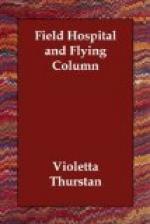The mode of procedure was this: When it was getting dusk you sauntered out to take a turn in the fresh air. You strolled through a certain square where there were men selling picture post-cards, etc. You selected a likely looking man and went up and looked over his cards, saying under your breath “Journal Anglais?” or “Flandres Liberale?” which ever it happened to be. Generally you were right, but occasionally the man looked at you with a blank stare and you knew you had made a bad shot, and if perchance he had happened to be a spy, your lot would not have been a happy one. But usually you received a whispered “Oui, madame,” in reply, and then you loudly asked the way to somewhere, and the man would conduct you up a side street, pointing the way with his finger. When no one was looking he slipped a tiny folded parcel into your hand, you slipped a coin into his, and the ceremony was over. But it was not safe to read your treasure at a front window or anywhere where you might be overlooked.
Sometimes these newspaper-sellers grew bold and transacted this business too openly and then there was trouble. One evening some of the nurses were at Benediction at the Carmelite Church, when a wretched newspaper lad rushed into the church and hid himself in a Confessional. He was followed by four or five German soldiers. They stopped the service and forbade any of the congregation to leave, and searched the church till they found the white and trembling boy, and dragged him off to his fate. We heard afterwards that a German spy had come up and asked him in French if he had a paper, and the boy was probably new at the game and fell into the trap.
About this time the Germans were particularly busy in Brussels. A great many new troops were brought in, amongst them several Austrian regiments and a great many naval officers and men. It was quite plain that some big undertaking was planned. Then one day we saw the famous heavy guns going out of the city along the Antwerp road. I had heard them last at Maubeuge, now I was to hear them again. Night and day reinforcements of soldiers poured into Brussels at the Gare du Nord, and poured out at the Antwerp Gate. No one whatever was permitted to pass to leave the city, the trams were all stopped at the barriers, and aeroplanes were constantly hovering above the city like huge birds of prey.
On Sunday, September 27, we woke to hear cannon booming and the house shaking with each concussion. The Germans had begun bombarding the forts which lay between Brussels and Antwerp. Looking from the heights of Brussels with a good glass, one could see shells bursting near Waelheim and Wavre St. Catherine. The Belgians were absolutely convinced that Antwerp was impregnable, and as we had heard that large masses of English troops had been landed there, we hoped very much that this would be the turning-point of the war, and that the Germans might be driven back out of the country.




